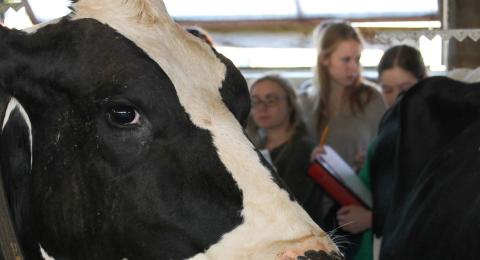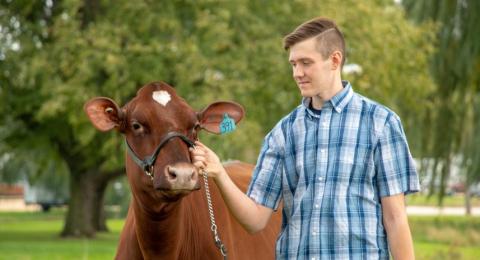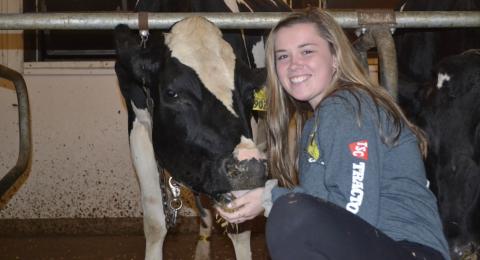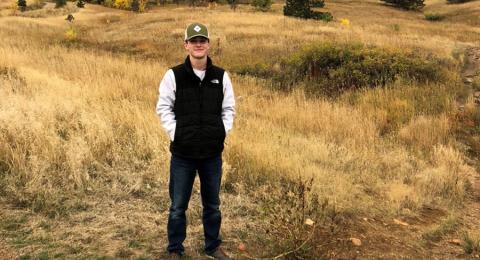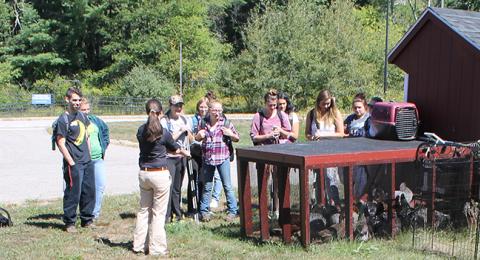Why study applied animal science?
The global demand for meat and milk from farm animals is expected to grow for decades to come. A degree in applied animal science will provide you with the foundational knowledge and skills you need for a challenging and fulfilling career in the rapidly changing field of farm animal production and management.
Why study applied animal science at UNH?
Students handle farm animals starting week one. Labs and comprehensive animal facilities introduce students to a wide range of subjects and give students firsthand experience turning knowledge into practice. Students, UNH is one of only three universities that offers students an opportunity to work with and manage every aspect of a dairy herd on campus through the UNH CREAM (Cooperative Real Education in Agriculture Management) program. Students can also work with poultry in our Poultry Experiential Education Program (PEEP) and sheep as part of the livestock management course. After obtaining an associate degree in applied animal science, qualified students may then transfer to the university’s four-year major and obtain a bachelor’s degree.
Potential careers
- Agricultural sales/service employee
- Artificial insemination (AI) technician
- Crop manager
- Farm-business owner
- Farm manager
- Farm owner
- Herd manager
Globally, farm animals far outnumber pets. Managing and keeping these farm animals healthy is a big business. Providing animal protein for people locally, nationally and worldwide offers endless opportunities for students who like to work with animals used in agriculture.
Curriculum & Requirements
The demand for and production of meat, milk and fiber from animals is expected to continue to grow for decades to come. Students interested in working in the highly technical, rapidly changing field of farm animal production and management, must become well versed in the many species of farm animals, including breeding, feeding, health care, housing and marketing. In the animal agriculture concentration, students apply many of the skills learned in the classroom on farms in the first few semesters of the program. Students learn to work safely with farm livestock and/or poultry. They visit farms and engage in hands-on activities with their instructors. Students will learn to balance rations, identify and treat diseases. They will design appropriate buildings, fences, and learn how to properly care for the land and environment necessary to support farm animals. Students visit and interact with nearby farms with sheep, goats, swine as well as dairy and beef cattle.
Students are encouraged to embrace opportunities to work and study at the University’s farms. UNH maintains two modern and well-equipped dairy teaching and research centers, and as an option students interested in dairy cattle can also collaborate to manage the CREAM (Cooperative for Real Education in Agriculture) herd. All students will also study at the UNH Organic Dairy Research Farm. Students will have the chance to also work with horses, sheep, and poultry on campus.
Students learn the business of farming through field exercises in land management, forage production, financial management, and computer use on a farm as well as through continued practical experience with farm livestock, poultry and dairy cattle. The program prepares students to work both on the farm and in related businesses.
The Thompson School’s Animal Agriculture program is in a unique position with the baccalaureate animal science major. Students may start with the Thompson School program, obtain their associate in applied science (A.A.S.) degree then transfer to a four-year major. There they would obtain a B.S. with two additional academic years of full-time study. This allows students to receive two degrees in as little as four years or obtain their A.A.S. degree and work in the field to later return for a B.S. Students wishing to follow this course of action need to work closely with their adviser and maintain a grade of C or better in key applied animal science courses.
Career Opportunities
Herd or flock manager, agricultural sales and/or service employee, farm manager, artificial insemination (AI) technician, crop manager, farm owner, or animal care or training professional.
Admissions Requirements
Applicants to the applied animal science program area must present four years of college preparatory English and at least two years, preferably three years of satisfactory work in college preparatory science (one of the sciences being biology, with a lab). One year of laboratory college preparatory chemistry is highly recommended. Also required are three years of social science, and three years of college preparatory mathematics.
Sample Degree Plan
This sample degree plan serves as a general guide; students collaborate with their academic advisor to develop a personalized degree plan to meet their academic goals and program requirements.
| First Year | ||
|---|---|---|
| Fall | Credits | |
| AAS 428 | Anatomy and Physiology of Domestic Animals | 4 |
| ANSC 421 | Introduction to Animal Science | 4 |
| ENGL 401 | First-Year Writing (DISC) | 4 |
| Discovery or AAS 425 1 | 4 | |
| Credits | 16 | |
| Spring | ||
| AAS 423 | Dairy Selection | 2 |
| AAS 434 | Equipment and Facilities Management | 3 |
| ADMN 400 | Introduction to Business | 4 |
| VTEC 435 | Animal Health and Laboratory Diagnostics | 4 |
| Discovery Course - Social Science | 4 | |
| Credits | 17 | |
| Second Year | ||
| Fall | ||
| AAS 432 | Introduction to Forage and Grassland Management | 3 |
| AAS 597 | Applied Animal Science Work Experience | 0 |
| ANSC 427 or ANSC 605 or ANSC 698 | Introduction to Equine Science or Poultry Production and Health Management or Cooperative for Real Education in Agricultural Management (CREAM) | 4 |
| Discovery Course: Quantitative Reasoning, PAUL 450 or other | 4 | |
| Discovery | 4 | |
| Elective | 2 | |
| Credits | 17 | |
| Spring | ||
| ANSC 406 | Careers in Animal Science | 1 |
| ANSC 543 | Technical Writing in Animal Sciences | 2 |
| ANSC 548 | Agricultural Business Management | 4 |
| ANSC 698 or ANSC 603 | Cooperative for Real Education in Agricultural Management (CREAM) or Introduction to Livestock Management | 4 |
| Elective or Discovery if AAS 425 was taken Freshman year 1 | 3 | |
| Credits | 14 | |
| Total Credits | 64 | |
- 1
CREAM must be taken both fall and spring semesters
- 2
20 credits of Discovery required; including ENGL 401 First-Year Writing, VTEC 435 Animal Health and Laboratory Diagnostics, a Quantitative Reasoning course, a Social Sciences course, and 1 other Discovery course
Degree Requirements
Major, Option, and Elective Requirements as indicated.
*Major GPA requirements as indicated.
Applied Animal Science Major Requirements
Applied Animal Science (AAS) students must maintain a minimum 2.0 cumulative grade-point average. Students with averages lower than 2.0 must repeat classes with lower grades and raise their average to the required 2.0 before taking additional classes. Students must have a minimum cumulative 2.0 grade-point average in AAS classes to qualify for graduation from the program.
All Applied Animal Science students are required to take:
| Code | Title | Credits |
|---|---|---|
| AAS 423 | Dairy Selection | 2 |
| AAS 428 | Anatomy and Physiology of Domestic Animals | 4 |
| AAS 432 | Introduction to Forage and Grassland Management | 3 |
| AAS 434 | Equipment and Facilities Management | 3 |
| AAS 597 | Applied Animal Science Work Experience | 0 |
| ADMN 400 | Introduction to Business | 4 |
| ANSC 406 | Careers in Animal Science | 1 |
| ANSC 421 | Introduction to Animal Science | 4 |
| ANSC 543 | Technical Writing in Animal Sciences | 2 |
| ANSC 548 | Agricultural Business Management | 4 |
| ANSC 698 | Cooperative for Real Education in Agricultural Management (CREAM) 1 | 4 |
| or ANSC 603 | Introduction to Livestock Management | |
| or ANSC 605 | Poultry Production and Health Management | |
| or ANSC 427 | Introduction to Equine Science | |
| ENGL 401 | First-Year Writing | 4 |
| PAUL 450 | Personal Finance (or other Quantitative Reasoning Discovery) | 4 |
| VTEC 435 | Animal Health and Laboratory Diagnostics | 4 |
| Discovery Social Science | 4 | |
| Discovery Course | 4 | |
| Electives 2 | 13 | |
| Total Credits | 64 | |
20 credits of Discovery courses are required, including Writing Skills (ENGL 401 First-Year Writing), Biological Science (VTEC 435 Animal Health and Laboratory Diagnostics), Quantitative Reasoning (PAUL 450 Personal Finance or other), Social Science, and Discovery elective.
- 1
Students that wish to take ANSC 698 Cooperative for Real Education in Agricultural Management (CREAM) must take AAS 425 Introduction to Dairy Herd Management in their first semester. CREAM is a two semester course (fall/spring).
- 2
Students without large animal experience are encouraged to enroll in AAS 421 Large Animal Behavior and Handling Techniques, as an elective.
Program Learning Outcomes
- Students will be able to describe the significance and unique characteristics of animal agriculture in New England, including species and breeds most appropriate for various agricultural enterprises.
- Students will demonstrate they can handle and restrain a variety of domestic animals for routine care, health management practices and training purposes.
- Students will be able to identify and describe the significant anatomical parts of and differences between horses, cattle, small ruminants and poultry.
- Students will understand the basis of disease, major pathogens causing disease, the techniques used in identifying parasites and pathogens, as well as keeping animals healthy through biosecurity measures.
- Students will gain an applied understanding of animal nutrition, animal selection and breeding and animal health practices through experiential coursework with dairy cattle, livestock and/or poultry.
- Students will be able to articulate the career opportunities available in the field of Animal Science.
- Students will be able to identify appropriate land, farm management strategies and forage crops in New England for farm animal feeding in the form of hay, silage and pasture.
- Students will demonstrate written and oral communication skills necessary for marketing animal products and services, information transfer, and animal related business development and promotion.
- Finally, students will demonstrate through the development of an animal related business plan that they understand the importance of market analysis, product promotion, sales techniques, labor management, financial statements, insurance and labor management.
Explore Program Details
The University of New Hampshire participates in the New England Board of Higher Education’s New England Regional Student Program where New England public universities and colleges offer a number of undergraduate curricula with reduced tuition to students from other New England states. The Applied Animal Science major qualifies for this program for certain New England states. See here for more information: New England Regional Student Program (NERSP)
